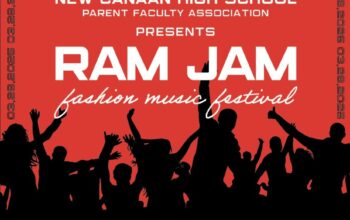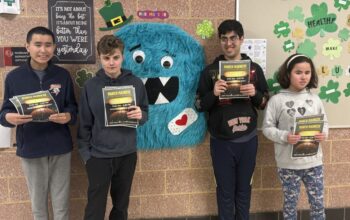Isabel Lawrence
Editor-in-Chief
Veterans from the New Canaan community participated in a series of interviews on Tuesday, Nov. 12 at NCHS as part of a Veteran’s Day project headed by social studies department chair Robert Stevenson. The project, which is comprised of veteran interviews conducted by juniors in American history classes, was filmed by NCTV in hopes of submitting the tapes to the Library of Congress’s Veterans History Project.

In the past, NCHS has held an annual Veteran’s Day assembly, in which the student body listens to veterans come in and talk about their experiences during their service. However, Mr. Stevenson was inspired to celebrate Veteran’s Day in a new way this year. “Mr. Webb last year gave a Veteran’s Day speech at the town Veteran’s Day service, and it was awesome. It was personal, heart felt, he talked about his family, he talked about people he’d met, it felt very personal,” Mr. Stevenson said. “And it got me thinking about how could we get kids to not only hear the speeches, but take it to the next level of thinking from a historian’s perspective.”
Mr. Stevenson decided that this next level of thinking could be achieved through participating in the Library of Congress’s Veterans History Project, a collection of videos, speeches, and personal stories of American veterans. Instead of the traditional assembly, this year two students from each American history class co-conducted a 30 minute interview with a veteran. These interviews took place every period of the day for the whole day, and were filmed by NCTV in the Wagner room. NCTV will now edit and produce the interview footage for submission to the Library of Congress.
According to Mr. Stevenson, because of NCTV’s facilities and capabilities, the interviews conducted will be valuable additions to the Veterans History Project. “Although there’ve been tens of thousands of interviews done, when I look at the material that’s online, the quality of the videos online is limited,” he said. “I think the TV Broadcasting students here have the ability to produce high quality video, so it’s kind of a real world application. I think we can do it as well or better than most of the stuff that’s out there.”
Before any filming could happen, the student interviewers, who volunteered or were selected from their American history classes, had to undergo preparation. Social Studies teacher Amy Rothschild, who has three classes of American History, helped guide her students. “We provided them with a list of questions that had been recommended by the Library of Congress, to whom this project is ultimately going, and we told them to select questions that they think are pertinent,” she said. “They should then streamline or focus their questions appropriately. The other instruction that I gave them was that they should absolutely work with each other in terms of coming up with the questions.”
Social Studies teacher Michael Staffaroni saw how this whole process was a learning experience for students, from preparation to execution. “The [interviewing]skills are the same, the skills of being comfortable enough with your subject to be prepared with the person you’re going to interview, to kind of understand what the point is and what do you want to get as an interviewer, what do you want to get out of the interview. These are all important skills for the students to learn,” he said. “We’re not just practicing and learning content, the content being the veteran’s story. The students will be learning these skills that can be developed and improved over time. The skill of oral history.”
Students not only learned a new skill set from this project, but were able to expand upon their classroom curriculum. “They’re studying these wars as lenses to look at service to the country, citizenship, duties, so we thought it made sense to try and hook into the community’s veterans as part of that lens, looking personally from New Canaan’s perspective at service and war-fare and citizenship,” Mr. Stevenson said.
Ms. Rothschild also saw how New Canaan’s perspective on service is so relevant for this project. “This community, New Canaan at large, has certainly had a history of being involved, being in a multitude of wars with military engagement, and I personally think that theres a thank you thats owed to these people who have been willing to put their lives on the line.”
Because these veterans are present in the local community, students were able to form personal ties with these former service men and women. “I think it’s great that it’s more personal, and it gets that one-on-one connection between the veteran and specific students,” Mr. Staffaroni said. “Beyond that, the fact that this is for a larger mission is also important. There is something very important to be said in honoring veterans in front of an assembly situation, and they should be honored in that way. And at the same time, this personal, one-to-one connecting with a younger student and an older vet, and having it recorded, that’s for austerity. That’s for everybody.”



